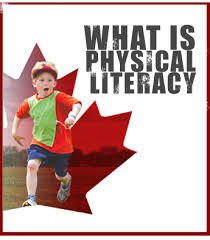
We have all heard of physical education, P.E., or gym class before; but have you heard of physical literacy? According to ParticipACTION, one of Canada’s biggest physical activity advocates, physical literacy can be defined as “the motivation, confidence, physical competence, knowledge, and understanding to value and take responsibility for engagement in physical activities for life”. Being physically literate makes it easier for individuals to translate different skill sets within new sports and activities. While this is a vital skill for athletes, it is also important for anyone that wants to live a happy and healthy lifestyle.
Canadian youth often begin to develop their physical literacy skills through the physical education curriculums in our education system. It has been shown that the earlier this development starts, the better, especially for later success as an athlete. Early development usually starts with active playing and games like Octopus or Freeze Tag. These types of games help teach children the skills and fundamentals necessary for different sports and physical activities they may want to try later in life.
However, even if a child does not want a future in sport, delaying physical literacy development can cause children frustration, which may lead to negative opinions around physical activity. This negative outlook can make it more difficult for a child to have an active lifestyle later in life. Therefore, it is important for educators to make sure that physical education curriculums are engaging, inclusive, and –most importantly – fun! By making sure that the activities are fun for everyone, educators are more likely to help children have a positive outlook on physical activity.
The development of physical literacy does not solely depend on the efforts made by educators. Responsibility to teach physical literacy also falls upon parents. There are many ways parents can help the development of their child’s physical literacy skills:
- Confirm your school is providing an engaging and positive environment for physical education curriculums.
- Show support for the different sports, games, and activities in which your child is interested..
- Set aside time to engage in fun physical activity as a family (e.g., passing around a ball, going on a hike, dancing, etc.)- being active does not always have to be structured!
- Lead by example! It is much easier for a child to learn about the benefits of a physically active lifestyle when they see their parents joining in on the fun.
The responsibility of physical literacy also belongs to school administrators and government officials. PHE Canada provides the following support:
- Ensures that physical education is an important part of the school curriculum
- Ensures that the teachers who are providing physical education are enthusiastic and qualified.
- Suggestions for physical activities outside of gym class throughout the school year (e.g., dance-a-thons, winter carnivals, play days, community walks/runs, etc.).
Physical literacy is not only important for young Canadians. Like any type of skill, physical literacy needs to be practiced throughout an individual’s lifetime. This skill allows Canadians of all ages to safely participate in physical activities which provides many benefits such as improved physical health, mental health, and cognitive abilities. Physical literacy can also help seniors maintain or improve their quality of life and contribute to increased independence and lower risk of injury and falls.
Although physical literacy comes more naturally to an individual when they are younger, do not worry if you were not able to develop these skills during childhood! Physical literacy can be taught and practiced at any age by engaging in new physical activities and focusing on different fundamental skills. Not many people are able to wake up in the morning and decide to go on a 10km run unless they have been practicing those skills regularly. However, many of us are quite capable of going for a brisk walk in the morning. It is important to not compare your skills to someone else’s, but instead compare yourself to the person you were yesterday. Even a small improvement is a step forward and you should be proud of that! It is all part of the process to having a happy and healthy lifestyle.
For more information on physical literacy, its benefits, and ways you can be active, check out the following resources: